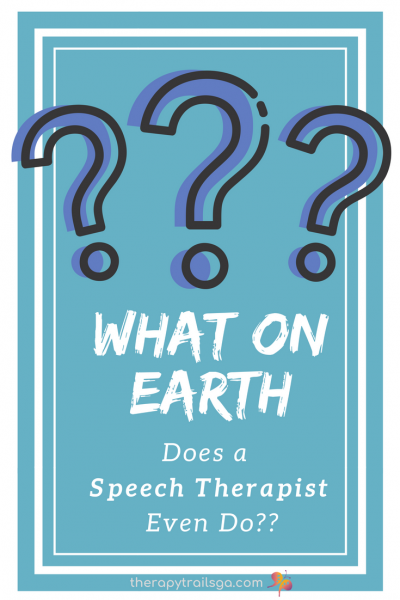What on Earth Does a Speech-Language Pathologist Do???
 Commonly referred to as the “speech teacher” or speech therapist, a speech-language pathologist (SLP) probably does more than you think! Yes, an SLP does the obvious and works on someone’s “speech.” …And yes, the SLP is known to play games all day, like Trouble, Candy Land, and Go Fish.
Commonly referred to as the “speech teacher” or speech therapist, a speech-language pathologist (SLP) probably does more than you think! Yes, an SLP does the obvious and works on someone’s “speech.” …And yes, the SLP is known to play games all day, like Trouble, Candy Land, and Go Fish.
But you may be wondering, what else? And with who?
News Flash: Every speech therapist is not the same. Some work in hospitals, while others work in a school. You’ll find one SLP in neonatal intensive care unit (NICU) and another one working in the nursing home. Don’t forget about the SLP’s that are in a private practice or early intervention agencies.
One More News Flash: speech therapist work with people of all ages. And yes, I mean all. That’s including infants to pediatrics to grandparents and everyone in between.
A SLP may specialize (or “be the expert”) in different settings, disorders, or age groups. Despite this, I have listed FIVE commonly treated areas below. Remember, this is not intended to be an exhausted list! If I wanted to describe every possible disorder treated through speech therapy, then I would have written a book! 🙂
1. Speech Production Disorders
As children begin to speak and say sounds, some may produce certain sounds wrong. By the age of 8, most children are saying all sounds correctly. Some sounds are acquired earlier (P, B, M) while others are expected later (R, L, and TH). If a child does not produce certain sounds by a certain age, then they may benefit from speech therapy. Children may also substitute, add, change, or delete sounds in words. Although this may be OK while the child is young, it can be problematic as she gets older. Speech sound difficulties or errors are also seen in conditions such as Childhood Apraxia of Speech, which occurs when the brain and muscles in the mouth have difficulty communicating and coordinating with each other.
See our list of developmental milestones for a description of typical ages for specific sound acquisition.
2. Language Disorders
A “language disorder” is when a child has difficulty with the comprehension (understanding) and/or use of language. This can be seen across a variety of areas, including using age-appropriate vocabulary, forming sentences, comprehending and retelling stories, asking or answering questions, following directions, and using correct grammar. This is not meant to be an extensive list of the language deficits seen and treated by SLPs! It only scratches the surface. Some of these language difficulties may not seem significant at first. However, if they are left untreated, further difficulties with reading, writing, and speaking may be seen as the child ages and begins school. Check out these free apps to help language disorders.

3. Pragmatic (Social) Disorders
“Pragmatics” is just another way to describe social skills, such as turn-taking, starting/continuing conversations, staying on topic, and other related skills. When talking to others, we use social communication elements like facial expressions, gestures and tone of voice. We have also learned how to change topics depending on the listener, greet others, and follow conversational rules. Some children have not picked-up on these social communication rules and skills. Enter SLP. This is who to turn to when a child needs help playing and talking with others.
4. Feeding & Swallowing Disorders
We’ve all had some food “go down the wrong way,” right? When kids and adults do this frequently, it can lead to many other health problems, such as pneumonia. SLP’s help others when they have difficulty eating age-appropriate liquids or solids.
And we all know someone that is a “picky eater,” right? What happens when a child is so picky that he only eats ONE brand of chicken or does not like different textures such as “lumpy mashed potatoes”. When picky-eating begins to affect someone’s weight or nutrition, he/she may need the help of an SLP!
5. Fluency (Stuttering) Disorders
Some children and adults may have trouble “getting words out.” Or maybe they repeat
a sound, word, or phrase before finishing the sentence. Some form of “interruption” in speech is seen, or heard rather. This is where your handy-dandy SLP will help out! Speech therapists will help encourage these children and adults to use smoother speech through the use of effective communication strategies.
Maybe this shed a little light into a day-in-the-life-of a speech-language pathologist. If you do not know your local SLP, be sure to find her (or him!) and say “hello!”
References:
American Speech Language and Hearing Association, Retrieved from: http://www.asha.org/public/speech/disorders/ChildSandL/ and http://www.asha.org/slp/clinical/
